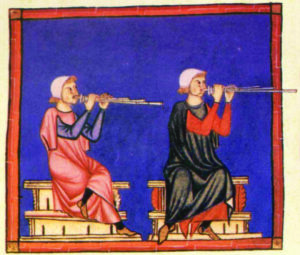By Freya Bergren
The Orchestra of New Spain (ONS) will present the fifth in a series of concerts exploring the musical culture of Medieval Spain’s Al Andalus. La Convivencia V showcases Sephardic, Christian and Muslim music on Saturday, Jan. 29 at 7 p.m. at Zion Lutheran Church, 6121 East Lovers Ln. at Skillman St. in Dallas. Tickets are $25 and $10 (with student ID) available through Ticketdfw.com or by calling 214-871-5000.

ONS adds new components to its series exploring the music and culture of Medieval Spain under the Islamic Caliphate that allowed Jews and Christians to work, worship and live in relative peace, a time known as La Convivencia (living together). New Spain soloists perform works from King Alfonso the Wise’s extensive collection of 420 songs set to poems retelling the miracles of Mary as collected by the King’s minions and known under the title of “Las Cantigas de Santa Maria.”
Canada’s Tamar Ilana, Sephardic and world music performer as well as flamenco dancer, comes to Dallas from a recent tour of Spain, a country she knows well from her youth as she accompanied her ethnomusicologist mother, Dr. Judith Cohen, around the Mediterranean world. Her Ladino and Arabic repertoire ranges from Spain, North Africa and the Ottoman regions. Jamal Mohamed and his World Music band perform works ranging from al-Andalus to North Africa and the Middle East. Instruments evocative of the time include the santour, oud, viols and the doumbek drum. A cultural interchange will be echoed on stage with a final artistic weaving together of music of the three cultures.
ONS’s two-year search for an academic partner to explore the historic roots of a phenomena much promoted in Spain in recent decades has come to fruition with a lecture offered at the Meadows Museum on January 27 titled “Convivencia in Medieval Spain: Fact or Fiction?” A panel of scholars will discuss the origin of interreligious coexistence and whether the concept accurately describes medieval Spain during what proponents of Convivencia have termed “The Golden Age.” Tamar’s theatrical chops will go live with a Flamenco show at Café Madrid following the academic presentation. Sephardic specialists like her are trending to incorporate flamenco rhythms in their repertoire.
Historically the gypsies arrived in Spain following the 1492 expulsion, however theories propose that Sephardic songs may have influenced flamenco as conversos intermingled with other marginalized people.
“It’s a timely look at the medieval example of peoples of the Abrahamic faiths. While we know that the Cantigas were written in a Galician dialect, we also know that all three cultures used the same instruments, playing the same melodies and no doubt sang their own texts,” notes Artistic Director Grover Wilkins III.
“It’s our second Convivencia under COVID, for which we have good experience in audience safety at the large sanctuary of Zion Lutheran Church.
For additional information on Orchestra of the New Spain, visit orchestraofnewspain.org.
